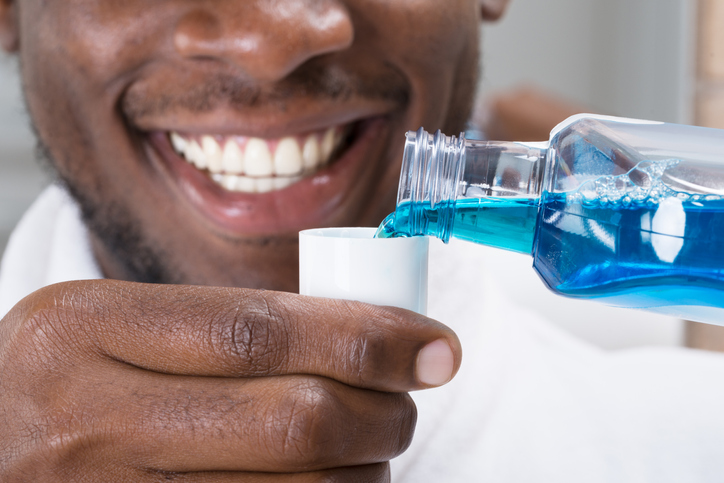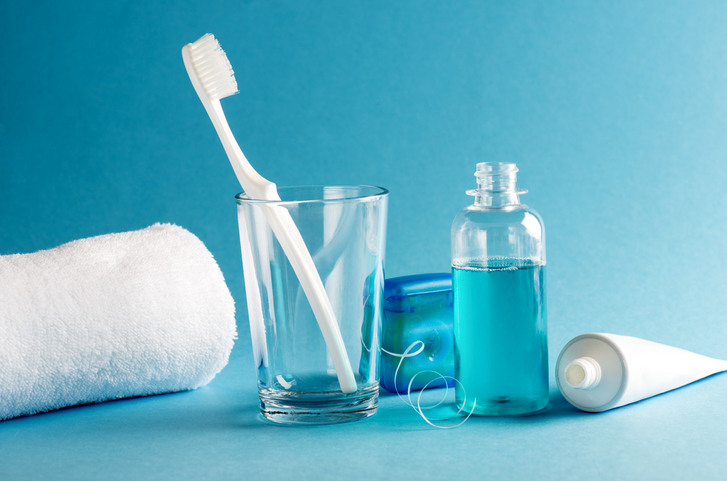Can’t Stand The Sting Of Mouthwash? COVID May Change Your Mind

By Joy Stephenson-Laws, J.D., Founder
I suspect many people are pretty indifferent to the use of mouthwash. You either use it regularly or you don’t. Or perhaps you use it only when you feel your breath is especially 'not so fresh. ''Whatever the case may be, mouthwash has always taken a backseat to the two cardinal rules for proper dental hygiene: brushing and flossing.
But a recent study conducted by researchers at Penn State College of Medicine may change the attitude of many people about mouthwash. In fact. mouthwash has become quite the topic of discussion lately. The researchers discovered that certain mouthwashes and oral antiseptics may have the ability to inactivate human coronaviruses.
Before I discuss this study further, I want to first be very clear in saying that the results did not definitively determine that mouthwashes and other oral rinses are cures for COVID-19 or provide 100 percent protection from the potential of being exposed to COVID-19.
The study looked at different types of oral and nasopharyngeal rinses and their ability to inactivate human coronaviruses. The researchers did not examine this specifically with COVID-19, however, they did look at a coronavirus very similar to SARS-CoV-2 (which is the virus that causes COVID-19).

In a nutshell, they found that some of these products reduced the amount of virus in the mouth after infection. This could potentially reduce the spread of virus and the severity of the infection.
"While we wait for a vaccine to be developed, methods to reduce transmission are needed," said Craig Meyers, a professor of microbiology and immunology and obstetrics and gynecology, according to this recent Medical Xpress report.
"The products we tested are readily available and often already part of people's daily routines."
Products tested included a one percent baby shampoo solution (which is sometimes used as a nasal rinse), different peroxide antiseptic rinses and different brands of mouthwash.
“They allowed the solutions to interact with the virus for 30 seconds, one minute and two minutes, before diluting the solutions to prevent further virus inactivation,” according to the report.
“To measure how much virus was inactivated, the researchers placed the diluted solutions in contact with cultured human cells. They counted how many cells remained alive after a few days of exposure to the viral solution and used that number to calculate the amount of human coronavirus that was inactivated as a result of exposure to the mouthwash or oral rinse that was tested.”
The results revealed:
- The one percent baby shampoo solution inactivated more than 99.9 percent of the human coronavirus after two minutes of contact time.
- Many of the mouthwashes and “gargle products” were also very effective. For example, many of them inactivated more than 99.9 percent of the virus just after 30 seconds of contact.
Again, this is not saying that mouthwashes and nasal rinses cure COVID-19 or provide a 100 percent protective shield. But as the lead study researcher mentioned, until there is a vaccine, we need to implement methods that can help reduce transmission. So if mouthwash has the potential to be an effective method, then why not use it?
There are, however, some possible downsides to using mouthwash. You can read all about this from these older pH Labs blogs. If in doubt about using mouthwash or if you have any existing health or dental issues, speak with a competent healthcare professional about which mouthwash may be personally best for you.
Now is the time to really practice good oral hygiene
Due to COVID-19, many people are not going to the dentist and getting their regular cleanings. Going to the dentist during these times is a personal choice, but we can all be proactive at home regarding our dental and gum health by not only brushing and flossing regularly but also by eating a diet rich in water-rich, nutrient-dense foods such as cucumbers. Read more about proactive oral health at home here.
Finally, take the necessary proactive steps to help protect yourself from COVID-19 and reduce the spread. This includes:
- wearing masks in public
- Regularly washing hands
- Taking care of your immune system
- Avoiding sneezing or coughing into your hands
Enjoy your healthy life!
Disclaimer: This article is not intended to provide medical advice. Please consult with your doctor or another competent healthcare practitioner to get specific medical advice for your situation.
The pH professional health care team includes recognized experts from a variety of health care and related disciplines, including physicians, attorneys, nutritionists, nurses and certified fitness instructors. This team also includes the members of the pH Medical Advisory Board, which constantly monitors all pH programs, products and services. To learn more about the pH Medical Advisory Board, click here.







